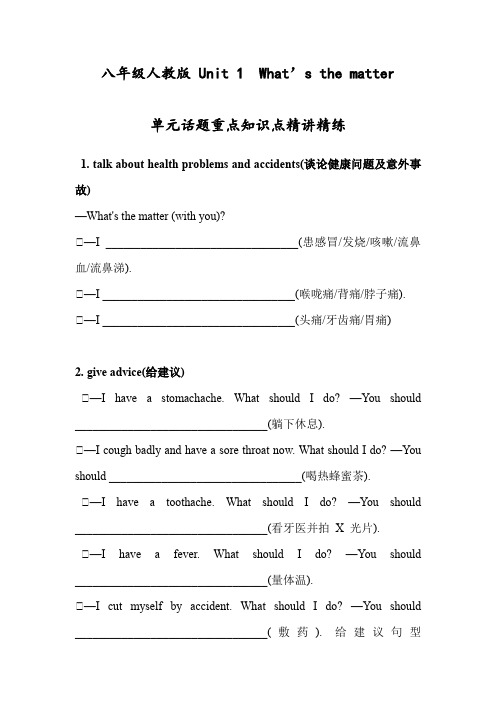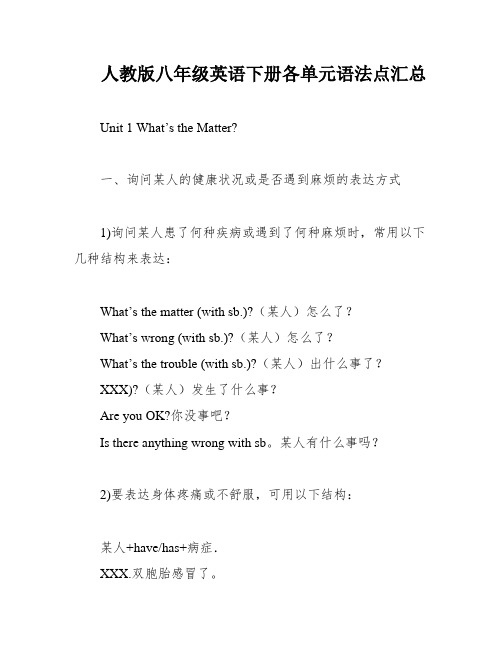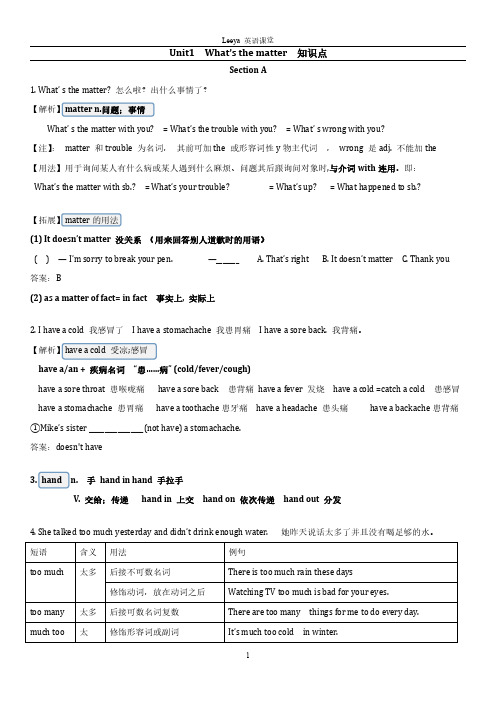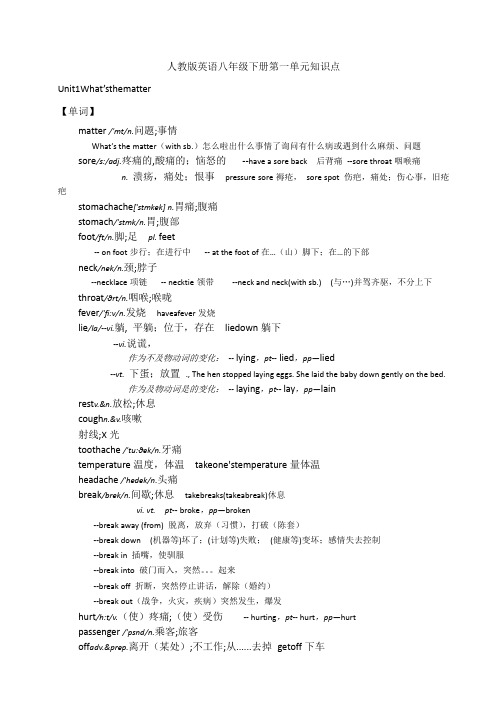人教版八年级下册Unit-1-What's-the-matter单元知识点
人教版初二(下)英语unit1 what's the matter知识点讲解与练习

八年级下册英语Unit 1 what’s the matter?词汇篇学生通过本讲学习,能够掌握本单元的重点词汇句型,并在综合能力上有一定的拓展。
1.matter的用法(1)名词:事情,问题What’s the matter? =what’s wrong (with you)? =what’s the trouble怎么啦?出什么事啦?(2)动词:有重大影响,有重要性如:What does it matter?2.疾病的表达法have a cold/a fever/ a toothache/ a stomachache3.take 的固定搭配take one’s temperature/ take breaks/ take risks/take some medicine/take off/ take care of/take away 4.surprise的用法1.做名词:to one’s surprise 使。
惊讶的,出乎。
意料2.做动词:surprise sb使某人吃惊3.做形容词:surprising, surprised的用法5.get的用法get off下车/get on上车/get into陷入,参与6.be used to sth/doing sth 习惯于做某事be used to do sth 被用作去做某事used to do sth 习惯于做某事7.out of的固定搭配look out of 向。
外看/ get out of从。
出来/ run out of用光基础演练1.---What’s wrong ______you?---I fell off the bike and hurt my leg.A. ofB. withC. forD. by2.Tom and Jenny enjoyed _________playing computer games.A. himselfB. herselfC. ourselvesD. themselves3. Sally became interested ___________science and wanted to be a scientist.A. forB. inC. throughD. at4. ---I had a __________.---You’d better go to see a dentist.A. headacheB. feverC. coldD. toothache5. I didn’t _________my temperature, but I knew I had a fever.A. giveB. setC. takeD. show二、根据汉语意思翻译句子。
人教版八年级英语下册 Unit 1 What’s the matter?知识点复习

人教版英语八年级下册第一单元知识点过关Unit 1 What’s the matter?一、重点短语1. have a fever 发烧,具体运用:She has a fever and she should lie down and rest.2. have a cough 咳嗽,cough既可以作名词,也可以作动词3. have a toothache 牙疼;tooth牙齿+ ache疼痛toothache 牙痛4. talk too much 说得太多;类似短语:eat too much吃太多5. drink enough water 喝足够的水;take enough money带够钱6. have a cold 受凉、感冒;也可以用catch a cold7. have a stomachache 胃疼;stomach胃+ache疼痛stomachache 胃疼8. have a sore back 背疼;sore疼痛+back背sore back背疼9. have a sore throat 喉咙痛10. lie down and rest 躺下休息11. hot tea with honey 加蜂蜜的热茶;with表示“带有”12. see a dentist 看牙医;看医生用“see”13. get an X-ray 拍X 光片14. take one’ s temperature 量体温;量体温、服药都用“take”15. put some medicine on sth. 在……上面敷药;例如:put some medicine on the cut在切口处敷药16. feel very hot 感到很热;feel感官动词,后接形容词17. sound like 听起来像;例如:sounds like a good idea 听起来像个好主意18. all weekend 整个周末;类似短语:all day \ all night \ all month19. in the same way 以同样的方式20. go to a doctor 看医生21. go along 沿着……走;类似短语:walk along22. on the side of the road 在马路边23. shout for help 大声呼救24. without thinking twice 没有多想;without是介词,后接动词ing形式25. get off 下车;反义词get on上车26. have a heart problem 患有心脏病27. to one’ s surprise 使....... 惊讶的;例如:to my surprise \ to his surprise28. thanks to 多亏了、由于;例如:Thanks to the the doctors , the patient was saved in time. 多亏了医生们,这个病人及时被救了。
最全面人教版八年级下册英语第一单元知识点归纳总结

Unit 1 What's the matter?一、词汇与短语◆重点单词A部分1.matter n. 问题;事情2.sore adj. 疼痛的;酸痛的3.stomachache n. 胃痛;腹痛4.foot n. 脚;足5.neck n. 颈;脖子6.stomach n. 胃;腹部7.throat n. 咽喉;喉咙8.hurt v. (使)疼痛;受伤9.fever n. 发烧10.passenger n. 乘客;旅客11.lie v. 躺;平躺12.break n. 间歇;休息13.rest v. &n. 放松;休息14.onto prep. 向;朝15.X-ray n. X射线;X光16.trouble n. 问题;苦恼17.toothache n. 牙痛18.hit n. (用手或器具)击;打19.headache n. 头痛20.herself pron. (she的反身代词)她自己21.off adv. & prep. 离开(某处);不工作;从……去掉B部分1.bandage n. 绷带v. 用绷带包扎2.press v. 压;挤;按3.sick adj. 生病的;有病的4.knee n. 膝;膝盖5.breathe v. 呼吸6.knife n. 刀7.sunburned adj. 晒伤的8.blood n. 血9.ourselves pron. (we反身代词)我们自己10.mean v. 意思是;打算11.climber n. 登山者;攀登者12.importance n. 重要性;重要13.risk n.&v. 危险;风险;冒险14.decision n. 决定;抉择15.accident n.(交通)事故;意外遭遇16.control v.&n. 限制;约束;管理17.situation n. 情况;状况18.spirit n. 勇气;意志19.kilo( = kilogram) n. 千克;公斤20.death n. 死;死亡21.rock n. 岩石22.nurse n. 护士◆重点短语A部分1.have a cold 感冒2.lie down 躺下3.have a stomachache 胃痛4.take one's temperature 量体温5.have a fever 发烧6.to one's surprise 使……惊讶的是7.get off 下车8.right away 立即;马上9.take breaks (take a break) 休息10.talk too much 说得太多11.drink enough water 喝足够的水12.have a very sore throat 嗓子非常疼13.get an X-ray 拍X光片14.see a dentist 看牙医15.drink some hot tea with honey 喝一些加蜂蜜的热茶16.put some medicine on sth.在……上面敷一些药17.feel very hot 感到很热18.sound like 听起来像19.all weekend 整个周末20.in the same way 以同样的方式21.go to a doctor 看医生22.go along 沿着……走23.on the side of the road 在马路边24.shout for help 大声呼救25.without thinking twice 没有多想26.have a heart problem 有心脏病27.thanks to 多亏了;由于28.in time 及时29.save a life 挽救生命30.get into trouble 陷入麻烦31.hurt oneself 受伤32.fall down落下;摔倒B部分1.be used to 习惯于……;适应于……2.in a difficult situation 在困境中3.take risks (take a risk) 冒险4.keep on doing sth. 继续(或坚持)做某事5.run out (of) 用尽;耗尽6.make a decision 作出决定7.cut off 切除8.get hit on the head 撞到头部9.get out of 离开;从……岀来10.be interested in 对……感兴趣11.give up 放弃12.mean doing sth. 意味着做某事13.put a bandage on sth. 用绷带包扎…14.lose one's life 失去生命15.feel sick 感到恶心16.mountain climbing 登山运动17.have problems breathing 呼吸困难18.be in control of 掌管;管理◆重点句子A部分1.What's the matter with you?=What's the trouble with you?=What's wrong with you?你怎么了?2.What should she do? 她该怎么办呢?3.Did you fall down? 你跌倒了吗?4.Should I take my temperature? 我应该量一下体温吗?5.I think I sat in the same way for too long without moving.我想我以同样的姿势一动不动地坐得太久了。
最新人教版八年级英语下册第一单元知识点汇总

最新人教版八年级英语下册第一单元知识点汇总Unit 1 What’s the matter?一、基础知识1.我感冒了。
可以表达为I had a cold、catch a cold或have the flu。
have a fever表示发烧,have a cough表示咳嗽,have a stomachache或肚子疼表示胃疼,have a toothache表示牙疼,have a headache表示头疼。
2.将身体部位和ache(疼痛)结合起来构成新的复合词,如stomach+ache=stomachache,head+ache=headache,tooth+ache=toothache,back+ache=backache,表示相应的疼痛。
3.“怎么啦?出什么事情了?”可以表达为What’ s the matter。
也可以用What’ s the trouble with you?或What’ s wrong with you。
matter和trouble为名词,其前可加the或形容词性物主代词,而wrong是形容词不能加the。
用于询问某人有什么病或遇到什么麻烦、问题,其后跟询问对象时,与介词with连用,如What’s the matter with sb。
= What’s your trouble?= What’s up?= What happens to sb。
举例来说,当问到“What’s the matter with you?”时,回答可以是“I have a bad cold.”4.maybe表示“或许”,常用于句首,表示可能性,后加句子。
例如Maybe you are right。
may be是情态动词+be的结构,意为“可能,也许”,后加名词、代词或形容词。
例如He maybe angry。
sound like可以和名词、代词以及从句结合使用,如It sounds like you don’t know the truth.It sounds like a good idea。
Unit1语法知识点梳理人教版英语八年级下册

人教版八年级英语下册语法知识点Unit1. What’s the matter?▶短语归纳1.have a cold 感冒2. have a stomachache 胃痛3. have a headache 头痛4. have a sore throat 喉咙痛5. have a fever 发烧6. have a cough 咳嗽7. have a heart problem 有心脏病8.hurt oneself伤到自己9.cut oneself割伤自己10.fall down 摔倒;跌倒11.get hit/sunburned 被击中/晒伤12. lie down 躺下13. take breaks/take a break 休息14. go to a/the doctor 看医生15.see a dentist 看牙医16. get an Xray 拍个X光片17. take one's temperature 量体温18. put some medicine on...在…上敷些药19.take sb. to the hospital带某人去医院20. take risks/take arisk冒险21.lose one’s life 失去生命22.run out(of)用尽;耗尽23.cut off 切除24.away from 远离25. make a decision /make decisions 做决定26.sound like 听起来好像27.get out of离开;从………出来28. get off 下车29. get to 到达30.get into 陷人;参与31.wait for 等待32.think twice 慎重考虑,再三考虑33.think about 考虑34. go mountain climbing 去爬山35. give up 放弃36. tell of叙述;描述37. the importance of……的重要性38. be interested in 对……感兴趣39. be in control of掌管;管理40.to one ’s surprise 使某人惊讶的是; 出乎某人的意料 41.thanks to 多亏;由于 42.in time 及时43.right away=at once 立即;马上 44. because of 因为 45.by oneself 独自;单独 46. too much 太多 47.a few 一些48.all weekend 整个周末 49. so that 以便▶用法集萃sth.需要某物1. needto do sth.需要做某事doing sth.某事需要被做2. see sb ..doing sth.看见某人正在做某事 do sth.看见某人做了某事3.mean to do sth.打算做某事 doing sth.意味着做某事4. expect/want (sb. ) to do sth 期待(某人)做某事/想要(某人)做某事 6. seem(to be)+形容词 好像……seem to do sth.好像做某事 seem + that 从句 好像.…7. agree/happen to do sth. 同意做某事/碰巧做某事 8.help sb.(to)do sth. 帮助某人做某事9.tell sb.(not)to do sth. 告诉某人(不要)做某事10.have problems(in)doing sth. 做某事有困难11. use sth. to do sth.= use sth. for doing sth.用某物做某事12. give up/ keep on doing sth. 放弃做某事/继续做某事13.mind doing sth.介意做某事14.so+形容词/副词+that从句15.It is/was+形容词+ that 从句如此……以至于…"某事是…▶语法专项一.询问某人的健康问题及遇到麻烦时的常用表达1.询问某人患了何种疾病或遇到了何种麻烦时,常用以下几种结构来表达: What's the matter (with sb.)?(某人)怎么了?What's wrong (with sb.)?(某人)怎么了?What's the trouble ( with sb.)?/ (某人)出什么事了?What happened (to sb.)?(某人)发生什么事了?Are you OK?你没事吧?Is there anything wrong( with sb. )?(某人)有什么事吗?2.要表达身体某一部位疼痛或不舒服,可用以下结构:(1)某人+have/has+病症The twins have colds.这对双胞胎感冒。
人教版八年级英语下册各单元知识点总结完整版

Unit 1 What’s the matter?一、重点短语1. have a fever 发烧2. have a cough 咳嗽3. have a toothache 牙疼4. talk too much 说得太多5. drink enough water 喝足够的水6. have a cold 受凉;感冒7. have a stomachache 胃疼8. have a sore back 背疼9. have a sore throat 喉咙痛10. lie down and rest躺下来休息11. hot tea with honey加蜂蜜的热茶12. see a dentist看牙医13. get an X-ray拍X光片14. take one’ s temperature量体温15. put some medicine on sth在……上面敷药16. feel very hot 感到很热17. sound like 听起来像18. all weekend 整个周末19. in the same way以同样的方式20. go to a doctor 看医生21. go along 沿着……走22. on the side of the road 在马路边23. shout for help 大声呼救24. without thinking twice 没有多想25. get off 下车26. have a heart problem 有心脏病27. to one’ s surprise 使……惊讶的28. thanks to 多亏了;由于29. in time及时30. save a life 挽救生命31. get into trouble 造成麻烦32. right away 立刻;马上33. because of 由于34. get out of 离开35. hurt oneself 受伤36. put a bandage on sth. 用绷带包扎37. fall down 摔倒38. feel sick 感到恶心39. have a nosebleed 流鼻血40. cut his knee割伤他的膝盖41. put her head back 把她的头向后仰42.have problems breathing呼吸困难43. mountain climbing登山运动44. be used to doing sth. 习惯做某事45. run out (of) 用完;用尽46. so that 以便47. so…that 如此……以至于……48. be in control of 掌管;管理49. in a difficult situation 在逆境屮50. keep on doing sth.坚持做某事51. make a decision做出决定52. take risks 冒险53. give up 放弃二、知识点解析1. What’s the matter? 怎么了?若是询问“某人怎么了?”要用“What’s the matter with sb.?”拓展:What’s the matter with sb.? 的同义句:What’s wrong with sb.? / What’s the trouble with sb.?2.疾病类短语:have a +疾病. e.g. :have a fever 发烧have a cold 感冒have a cough 咳嗽.have a +身体部位-ache. e.g.: have a headache 头痛have a toothache 牙痛.have a sore+身体部位. e.g.: have a sore throat咽喉痛have a sore back背痛例题:Mom, I____________.I’m sorry to hear that, dear. We must go to see the dentist right away.A. have a headacheB. have a stomachacheC. have a toothacheD. have a fever3. lie down 躺下V. 躺,平躺。
人教新目标 八年级英语下册 Unit1 Whats the matter? 短语语法知识点总结汇总

短语语法知识点总结汇总Unit1 What's the matter?人教新目标八年级英语下册 Unit 1 What's the matter背短语一、必 Section A 部分1.患感冒 have a cold2.胃痛 have a stomachachehave a sore back have a sore throat 3.喉咙痛 4.背痛lie down and rest 6. take one's temperature5.躺下休息量体温8.休息 talk too much 说得太多7. take breaks/a break10.拍Xget off 光片 9.下车 get an X-ray12.see sb. doing 反复考虑think twice 11.看见某人正在做..14.使…惊讶的to one's surprise expect sb. to do 13.期待某人去做某事16.及时agree to do sth. in time同意做某事15.18.陷入困境;惹麻烦多亏,由于get into troublethanks to17.Section B 部分1.休息几天 rest for a few days2.把…放下;低下 put…downtell sb. not to do3.告诉某人做某事 tell sb. to do4.告诉某人不要去做5.做某事有问题/麻烦/困难 have problems/trouble/difficulty (in) doing sth7.习惯于做某事对…感兴趣 be used to doing sth be interested in ed to do sth take risks/a risk 8.过去常常做某事 9.冒险10.由于/11.处于险境因为+n./pron. in a dangerous situation because of12.处于困境 inarun out (of)difficult 13.用尽,耗光situation14.准备/乐于做某事 be ready to do 15.切除 cut offso that/in order that 以便于;为了 17.16.如此…以至于……so…thatmake decisions/a decision get out of 19.做决定 18.离开;从..出来the importance of……21.be in control of 的重要性掌控,管理20.put a bandage on… 23.用绷带包扎give up 22.放弃seem to do好像做某事/似乎继续做某事24.25.keep on doing【教材内容解析】Section AWhat's the matter? (P. 1)1.意为“怎么了?出什么事了?”,常用来询问对方遇到什么麻烦或者有什么不What's the matter 某物怎么了”表示“某人with sb./sth.顺心的事,后接/ 。
人教版英语八年级下册 Unit 1 单元话题重点知识点精讲精练

八年级人教版 Unit 1 What’s the matter单元话题重点知识点精讲精练1. talk about health problems and accidents(谈论健康问题及意外事故)—What's the matter (with you)?①—I _________________________________(患感冒/发烧/咳嗽/流鼻血/流鼻涕).①—I _________________________________(喉咙痛/背痛/脖子痛). ①—I _________________________________(头痛/牙齿痛/胃痛)2.give advice(给建议)①—I have a stomachache. What should I do? —You should _________________________________(躺下休息).①—I cough badly and have a sore throat now. What should I do? —You should _________________________________(喝热蜂蜜茶).①—I have a toothache. What should I do? —You should _________________________________(看牙医并拍X 光片).①—I have a fever. What should I do? —You should _________________________________(量体温).①—I cut myself by accident. What should I do? —You should _________________________________(敷药). 给建议句型___________________________________________________________ _______________________________________重点知识点:①matter n.问题;事情What's the matter ___________ you?(matter 可换成___________)What's ___________ with you? What happened ___________ you?matter v.要紧;有重大影响;事关紧要It doesn't matter.没关系The only thing that really matters is what the wall looks like when we are done and how much fun we have painting it.唯一重要的事情是当我们结束时墙的样子以及我们在刷墙过程中得到多少快乐。
人教版八年级下英语各单元重难点归纳

人教版八年级下英语各单元重难点归纳Unit 1 What’s the matter?本单元考点,重点三个:一、询问身体不适并给出建议的句型二、v.-ing形式的非谓语动词三、反身代词一、询问身体不适并给出建议的句型:(一)对“身体不适”的提问:“怎么了?”1、What’s the matter (with you)?2、What’s the trouble (with you)?= 3.What’s your trouble?4、What’s wrong(with you)?5、What’s up?6、What happens to you?7、What’s the problem(with you)?(二)、“身体不适”的简要表达:1、主语+ have/has + a + 病症(1) I have a cold.= I catch a cold. =I get a cold. =I have the flu.我感冒了。
I have a bad cold.我得了重感冒。
(2) I have a fever.我发烧了。
I have a high fever.我发高烧了。
(3) I have a cough.我咳嗽了。
(4) I have a nosebleed.我出鼻血了。
2、主语+ have /has + a + 身体部位-ache(1) I have a toothache.我牙疼。
I have a bad toothache.我牙疼的厉害。
(2) I have a stomachache.我胃疼。
(3) I have a headache.我头疼。
(4) I have a backache.我后背疼。
3、主语+ have/has + a + sore + 发病部位(1) I have a sore back.我后背疼。
(2) I have a sore throat.我嗓子疼。
I have a very sore throat.我嗓子疼的厉害。
人教版八年级下册英语Unit1知识点语法归纳总结

⼈教版⼋年级下册英语Unit1知识点语法归纳总结Unit 1 What’s the matter?1.短语归纳2.典句必背3.⽤法集萃(1)当别⼈⼼情不好,⾝体不适或遇到⿇烦时,我们可以⽤如下表达表⽰关⼼:?What’s the matter? What’s the matter with youWhat’s wrong with …What’s the trouble\problem with …(2)英语中常⽤have描述⾝体的不适,此时have意为“患有”,常⽤结构:①have a + 疾病例:have a cold 感冒;have a fever 发烧;have a cough 咳嗽②have a + ⾝体部位-ache例:have a headache 头痛;have a toothache ⽛痛③have a sore + ⾝体部位例:have a sore throat 咽喉痛;have a sore back 背痛(3)lie down躺下;tell lies/a lie 说谎(4)maybe & may be①maybe,“或许”,常⽤于句⾸,表⽰可能性,后加句⼦。
例:Maybe you are right.②may be,是情态动词+be的结构,意为“可能,也许”,后加名词、代词或形容词。
例:He may be angry.(5)sound like & sound①sound like+名词/代词/从句例:It sounds like you don’t know the truth. It sounds like a good idea.②sound+形容词,“听起来,好像”,例:The music sounds nice.(6)…when the driver saw an old man lying on the side of the road. ……这时司机看到意为⽼⼈躺在路边。
Unit1what’sthematter_SectionA知识点梳理人教版八年级英语下册

人教版八年级下册英语课本知识点梳理Unit 1 wh at’s the matter? sectionA课文内容:What's the matter? 怎么了? (教材第1页)【用法详解】What's the matter? 怎么了?/出什么事了?常用于询问某人患了何种疾病,遇到了什么困难等,也可用于询问某物出了什么故障,其后可接with sb./sth.,表示“某人/某物怎么了?”。
其中matter 用作名词,意为“问题;事情”matter前须加定冠词the。
【例句】What's the matter? 怎么了?Bad luck.I lost my pen. 真倒霉,我弄丢了钢笔.What's the matter with him? 他怎么了?He has a sore back.他背痛【拓展】matter[动词] 要紧;有关系多用在否定句、疑问句或条件句中It doesn't matter.没关系。
(通常用来回答对方的道歉)I have a cold. 我感冒了。
(教材第1页)【用法详解】have a cold (患)感冒。
其中have 用作及物动词,意为“患(病);遭受(病痛)”,常用于结构“have a/an +疾病名称”表示患病或身体某部位不舒服。
此时它不能用于进行时态,其第三人称单数形式为has,过去式为had。
常见的表示病痛的短语还有:have a fever 发烧have a toothache 牙疼have a headache头痛have a cough 咳嗽have a stomachache胃痛Do you often have a cold? 你经常感冒吗?Jim had a stomachache after supper yesterday.吉姆昨天晚饭后胃痛。
l have a stomachache.我胃痛。
( 教材第1 页)【用法详解】stomachache [名词]胃痛;腹痛是由“名词stomach(;腹部)+ache(疼痛)”构成的复合名词。
人教版八年级下册Unit-1-What's-the-matter单元知识点

Unit 1 What’s the matter?一、基本知识点1. What’s the matter (with you)? 怎么了?出什么事了?What’s the trouble/ the problem / wrong with sb./ sth.?2. I had a cold.我感冒了。
have a cold=catch a cold=have the flu have a fever have a cough咳嗽have a stomachache胃疼,肚子疼 have a toothache牙疼 have a headache头疼3. 身体部位+ache(疼痛)构成新的复合词stomach+ache=stomachache head+ache=headache tooth+ache=toothache back+ache=backache后背痛4. much too+ 词,意为,too much+ 词,意为。
5. enough【形容、副词】足够的/地,enough放在名前后,形副后。
good enough足够好,enough money=money money6. lie down躺下, lie 躺,躺着,过去式lay;lie说谎,过去式lied7. maybe “或许”,常用于句首,表示可能性,后加句子。
Maybe you are right.may be,是情态动词+be的结构,意为“可能,也许”,后加名词、代词或形容词。
He may be angry.8. sound like+名词代词和从句:It sounds like you don’t know the truth. It sounds like a good idea.sound+形容词,“听起来,好像”,The music sounds nice.9. need 需要,实义动词need+名词,需要某物;need to do sth.需要做某事,主语通常是人,表示人主动的动作:You need to listen carefully during class.need doing sth.主语通常是物,表示被动的动作:Your dirty clothes need washing.10. get off (the bus) 下(公交车) get on 上车11. agree 同意,赞同;同意做某事,同意某人的看法、观点。
人教版八年级英语下册各单元语法点汇总

人教版八年级英语下册各单元语法点汇总Unit 1 What’s the Matter?一、询问某人的健康状况或是否遇到麻烦的表达方式1)询问某人患了何种疾病或遇到了何种麻烦时,常用以下几种结构来表达:What’s the matter (with sb.)?(某人)怎么了?What’s wrong (with sb.)?(某人)怎么了?What’s the trouble (with sb.)?(某人)出什么事了?XXX)?(某人)发生了什么事?Are you OK?你没事吧?Is there anything wrong with sb。
某人有什么事吗?2)要表达身体疼痛或不舒服,可用以下结构:某人+have/has+病症.XXX.双胞胎感冒了。
某人XXX.XXX.她昨晚肚子痛。
某人XXX.他喉咙痛。
某人XXX(s)+身体部位或反身代词.XXX his XXX.他的腿受伤了。
某部位+hurt(s).My head hurts badly.我头痛得厉害。
某人+have/has+a pain+in one’s+身体部位,I have a XXX.我胸口痛。
There is) something wrong with one’s+身体部位.There is something wrong with my right eye.我的右眼有毛病。
其他表达方式She has a heart trouble.她有心脏病。
He got hit on the head.他头部受到了撞击。
She cut her finger.她割破手指了。
二、情态动词should的用法情态动词should表示应该做某事,常用于建议、命令、劝告等语境中。
例如:You should see a doctor if you have a fever.如果你发烧了,你应该去看医生。
XXX't eat too much junk food.你不应该吃太多垃圾食品。
人教版英语八年级下册第一单元Unit 1知识点

Unit1What’s the matter知识点Section A1.What’s the matter?怎么啦?出什么事情了?【解析】matter n.问题;事情What’s the matter with you?=What’s the trouble with you?=What’s wrong with you?【注】:matter和trouble为名词,其前可加the或形容词性y物主代词,wrong是adj.不能加the【用法】用于询问某人有什么病或某人遇到什么麻烦、问题其后跟询问对象时,与介词with连用。
即:What’s the matter with sb.?=What’s your trouble?=What’s up?=What happened to sb.?【拓展】matter的用法(1)It doesn’t matter没关系(用来回答别人道歉时的用语)()—I’m sorry to break your pen.—_______ A.That’s right B.It doesn’t matter C.Thank you 答案:B(2)as a matter of fact=in fact事实上,实际上2.I have a cold我感冒了I have a stomachache我患胃痛I have a sore back.我背痛。
【解析】have a cold受凉;感冒have a/an+疾病名词“患……病”(cold/fever/cough)have a sore throat患喉咙痛have a sore back患背痛have a fever发烧have a cold=catch a cold患感冒have a stomachache患胃痛have a toothache患牙痛have a headache患头痛have a backache患背痛①Mike’s sister_________________(not have)a stomachache.答案:doesn't have3.hand n.手hand in hand手拉手V.交给;传递hand in上交hand on依次传递hand out分发4.She talked too much yesterday and didn’t drink enough water.她昨天说话太多了并且没有喝足够的水。
人教版英语八年级下册第一单元知识点

人教版英语八年级下册第一单元知识点Unit1What’sthematter【单词】matter /'mt/n.问题;事情What’s the matter(with sb.)怎么啦出什么事情了询问有什么病或遇到什么麻烦、问题sore/s:/adj.疼痛的,酸痛的;恼怒的--have a sore back 后背痛--sore throat咽喉痛n. 溃疡,痛处;恨事pressure sore褥疮,sore spot 伤疤,痛处;伤心事,旧疮疤stomachache['stmkek] n.胃痛;腹痛stomach/'stmk/n.胃;腹部foot/ft/n.脚;足pl. feet-- on foot步行;在进行中-- at the foot of在…(山)脚下;在…的下部neck/nek/n.颈;脖子--necklace项链-- necktie领带--neck and neck(with sb.) (与…)并驾齐驱,不分上下throat/θrt/n.咽喉;喉咙fever/'fi:v/n.发烧haveafever发烧lie/la/--vi.躺, 平躺;位于,存在liedown躺下--vi.说谎,作为不及物动词的变化:-- lying,pt-- lied,pp—lied--vt. 下蛋;放置., The hen stopped laying eggs. She laid the baby down gently on the bed.作为及物动词是的变化:-- laying,pt-- lay,pp—lainrest v.&n.放松;休息cough n.&v.咳嗽射线;X光toothache /'tu:θek/n.牙痛temperature温度,体温takeone'stemperature量体温headache /'hedek/n.头痛break/brek/n.间歇;休息takebreaks(takeabreak)休息vi. vt.pt--broke,pp—broken--break away (from) 脱离,放弃(习惯),打破(陈套)--break down (机器等)坏了;(计划等)失败;(健康等)变坏;感情失去控制--break in 插嘴,使驯服--break into 破门而入,突然。
新人教版初二下册英语知识点归纳-Unit-1-What’s-the-matter

新人教版初二下册英语知识点归纳:Unit-1-What’s-the-matter一.询问某人患了何种疾病或遇到什么费事时,常用以下句型:1.What’s the matter 〔with sb〕?2. What’s the trouble / problem〔with sb〕?3.What’s wrong 〔with sb〕? 你怎么了?4. What’s one’s trouble / problem ?5.What’s up ?6. What happened to sb ?7.Are you OK ? 8. Is there anything wrong with sb ?二.表达身体不适或疼痛时,常用以下构造:1.Sb + have /has + a / an + 疾病名称:have acold(患感冒)/ fever / cough / temperature注:have a cold相当于get a cold/catch a cold/have got a cold;have a bad cold(患重感冒);have a heart problem 有心脏病2.Sb + have/ has a sore +身体部位:have a sore throat / back3.Sb + have / has+ a+ 身体部位+ache(构成疾病名词)have a toothache /headache / stomachache / earache /backache4.Sb + hurt(s) +身体部位/ oneself ; He hurt his leg .或身体部位+ hurts ; My head hurts badly .5.There is someth ing wrong with one’s +身体部位。
6.Sb +have /has a pain in one’s +身体部位三.情态动词should / should’t 的用法:意为’应该,应当’ 后接动词原形,无人称和数的变化。
- 1、下载文档前请自行甄别文档内容的完整性,平台不提供额外的编辑、内容补充、找答案等附加服务。
- 2、"仅部分预览"的文档,不可在线预览部分如存在完整性等问题,可反馈申请退款(可完整预览的文档不适用该条件!)。
- 3、如文档侵犯您的权益,请联系客服反馈,我们会尽快为您处理(人工客服工作时间:9:00-18:30)。
Unit 1 What’s the matter?一、基本知识点1. What’s the matter (with you)?怎么了?出什么事了?W hat’s the trouble/ the problem / wrong with sb./ sth.?2. I had a cold.我感冒了。
have a cold=catch a cold=have the fluhave a feverhave a cough咳嗽have a stomachache胃疼,肚子疼have a toothache牙疼have a headache头疼3. 身体部位+ache(疼痛)构成新的复合词stomach+ache=stomachache head+ache=headache tooth+ache=toothache back+ache=backache后背痛4. much too+ 词,意为,too much+词,意为。
5. enough【形容、副词】足够的/地,enough放在名前后,形副后。
good enough足够好,enough money=money money6. lie down躺下, lie 躺,躺着,过去式lay;lie说谎,过去式lied7. maybe “或许”,常用于句首,表示可能性,后加句子。
Maybe you are right.may be,是情态动词+be的结构,意为“可能,也许”,后加名词、代词或形容词。
He may be angry.8. sound like+名词代词和从句:It sounds like you don’t know the truth. It sounds like a good idea.sound+形容词,“听起来,好像”,The music sounds nice.9. need 需要,实义动词need+名词,需要某物;need to do sth.需要做某事,主语通常是人,表示人主动的动作:You need to listen carefully during class.need doing sth.主语通常是物,表示被动的动作:Your dirty clothes need washing.10. get off (the bus) 下(公交车) get on 上车11. agree 同意,赞同;同意做某事,同意某人的看法、观点。
12. trouble问题,麻烦;be in trouble,make trouble ,have trouble (in) doing sth. =have difficulties (in) doing sth。
13. right away=right now=at once,意为。
14.【复习】advice [不可数名词]劝告,建议,向…征求意见,give sb. advice on sth.就某事给某人建议; advise [动词] advise sb. to do sth. advise sb. doing sth .15. 【复习】exercise 动词意为,可数时意为,不可数时意为。
16. hurt 及物动词,使……疼痛,……受伤,He hurt his leg while exercising.不及物动词,……(部位)疼。
His leg hurt badly.17. clean 【动词】,clean the classroom,【形容词】,cleaner意为。
18. hit (用手或器具)打;击打 The boy hit the dog with a stone.hit sb. on the head/ nose/ back打某人的头、鼻子、后背,on用在所打较硬的部位;hit sb. in the face/ eye/ stomach 打某人的脸、眼睛、肚子,in用在所打较软的部位。
19. be used to sth./ doing sth.习惯于、适应了……、做某事,强调状态;His grandpa was used to country life.Mary is not used to getting up early in the morning.get/ become used to sth./ doing sth. “变得习惯,逐渐适应……”强调过程、动作:It’s difficult for one to get used to another country’s habit.20. 【复习】free [形容词]空闲的free time;免费的the drink is for free;自由的I want to become a free bird.free【动词】使……解脱,得到自由He could not free his arm.21. run out用完,用尽 When his water run out, he knew that he would have to do something to save his own life.物sth. tun out. 某物用尽了。
人sb. run out of物sth..人用尽了某物。
He run out of all his money last night.22. risk (sb.) to do sth. 冒险去做某事take a risk=take risks 冒险23. the importance of (doing) sth.(做)某事的重要性 We students should know the importance of (learning) English. importance n. 重要(性), important adj.重要的,unimportant adj.24. decision 【名词】决定;抉择; make a decisionmake a decision to do sth.=。
25. be in the control of …掌管,管理 The headmaster is in the control of this new school.be out of control无法控制,无法管理 be under control被控制住,在控制之中26. 【复习】mind意为,mind doing sth., Would you mind my opening the window?27. give up (doing) sth. 放弃(做)某事,give up (playing) computer games;give up后可接名词、代词和动词ing 形式,也可不接,如Never give up easily.二、重要短语1. have a cold2. have a stomachache3. see sb. do sth.4. shout for help5. expect (sb.) to do sth.6. to one’s surprise7. thanks to …8. think about…9. be interested in sth.10. lose one’s life11. save one’s life12. take a risk=take risks13. cut off14. keep on doing sth.三、重点语法——反身代词【反身代词】英语中共有八个反身代词,在使用时应注意和它所指的相应的对象在人称、性别、数上保持一致。
【用法】1. 可用作宾语,指的是宾语和主语表示同一个或同一些的人或事物。
如:Maria bought herself a scarf. We must look after ourselves very well.2. 可用作表语,指的是表语和主语表示同一个或同一些人或事物。
如:She isn’t quite herself today.3. 可用作主语或宾语的同位语,常用来加强语气。
如:She herself will fly to London tomorrow. I met the writer himself last week.4. 用在某些固定短语当中。
look after oneself / take care of oneself 照顾自己teach oneself sth./ learn sth. by oneself自学enjoy oneself玩得高兴,过得愉快help oneself to sth请自用……(随便吃/喝些……). hurt oneself摔伤自己say to oneself自言自语leave sb. by oneself把某人单独留下buy oneself sth.给自己买……东西【提醒】1. 反身代词不能单独做主语,但可以做主语的同位语,起强调作用。
如:我自己能完成作业。
(误)Myself can finish my homework. (正) I myself can finish my homework. / I can finish my homework myself. 2. 反身代词表示“某人自己”不能表示“某人的东西”,因为它没有所有格的形式。
表达“某人自己的(东西)”时,须要用one’s own.如:我用我自己的蜡笔画画。
(误)I’m drawing with myself crayons. (正) I’m drawing with my own crayons.【练习】一、选择适当答案。
1. Those girls enjoyed ____ in the party last night. A. them B. they C. themselves D. herself2. Help ____ to some fish, children. A. yourself B. your C. yours D. yourselves3. The film ____ is very fun. A. it’s B. itself C. it D. its4. –Who teaches ____ math? –I teach ______.A. your, my self B. you, myself C. you, me D. you, herself5. The father will make ____ a bike ____. A. her, himself B. she, himself C. her, herself D. she, herself6. The scarf is ____, she made it_____. A. herself, her B. herself, hers C. hers, herself D. her, herself7. Liu Hulan’s death was great. She thought more of others than ______. A. her B. she C. hers D. herself8. Luckily, he didn’t hurt ____ terribly yesterday. A. him B. themselves C. himself D. they9. I can’t mend my shoe _____. Can you mend it for _____? A. myself, me B. myself, IC. me, ID. I, me10. I like watching ____ in the mirror. A. me B. I C. my D. myself二、用适当的反身代词填空。
